Search Results
Showing results 21 to 40 of 70
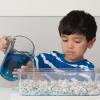
Water Underground
Source Institutions
Many people get water from a source deep underground, called groundwater.

Model the Sun and Earth
Source Institutions
In this activity, learners make scale models of the Sun and Earth out of paper mache.
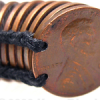
Penny Rubbing
Source Institutions
In this art-related activity, learners make a coin rubbing—a process similar to what archeologists may do with ancient artifacts. This activity can be used in connection with a history or art lesson.

OBIS Oil Spill
Source Institutions
In this outdoor activity, learners simulate an oil spill using popcorn (both oil and popcorn float on water), and estimate the spill's impact on the environment.
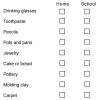
Mineral Hunt
Source Institutions
In this activity, learners search for various kinds of items made from minerals around their home or school, including toothpaste, wall paint, kitty litter, and bricks.

Gaming in the Outdoors
Source Institutions
In this set of outdoor games, learners increase their awareness of the outdoor environment by going on a scavenger hunt and an out-of-place hunt.

Super Soil
Source Institutions
In this outdoor activity, learners make their own organic-rich soil. Depending on where this activity is done, learners will probably discover that their local soil is low in organic matter.
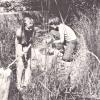
What Lives Here
Source Institutions
In this outdoor activity/field trip, learners explore an aquatic site such as a pond, lake, stream, river or seashore to find and investigate plants and animals that live in water.
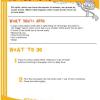
Ocean in a Bottle
Source Institutions
In this simulation activity, learners observe what can happen when ocean waves churn up water and oil from an oil spill.
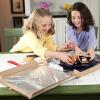
Cook with a Solar Oven
Source Institutions
In this activity, learners make their own solar oven to bake s'mores and learn about how solar energy is absorbed on Earth.
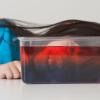
Freezing Lakes
Source Institutions
In some parts of the world, lakes freeze during winter. In this activity learners will explore water’s unique properties of freezing and melting, and how these relate to density and temperature.

Detect Solar Storms
Source Institutions
In this activity, learners build their own magnetometer using an empty soda bottle, magnets, laser pointer, and household objects.

Dip Dip, Hooray
Source Institutions
Lakes, streams and other freshwater bodies are a habitat for lots of living things, big and small.
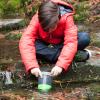
Window Under Water
Source Institutions
Glare from the sun and ripples from the wind can make it hard to see what's below the surface of a body of water.
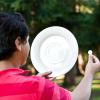
Big Sun, Small Moon
Source Institutions
Learners will explore the concept of angular distance, and investigate why the moon appears to be the same size as the sun during a solar eclipse, despite the sun being much larger.

Cool It
Source Institutions
In this outdoor activity/game, learners use thermometers to simulate how lizards survive in habitats with extreme temperatures.

Moon and Stars
Source Institutions
In this craft activity, learners create a string of cut-out moons and stars.
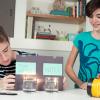
Make a UV Detector
Source Institutions
In this activity, learners use tonic water to detect ultraviolet (UV) light from the Sun and explore the concept of fluorescence.
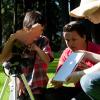
Spot the Sunspots
Source Institutions
In this activity, learners use binoculars (or a telescope) to identify and track sunspots. If using binoculars, learners need a pair that can be secured on a tripod.

Invent a Plant
Source Institutions
In this activity, learners construct models of plants that are adapted to living under specific environmental conditions.
